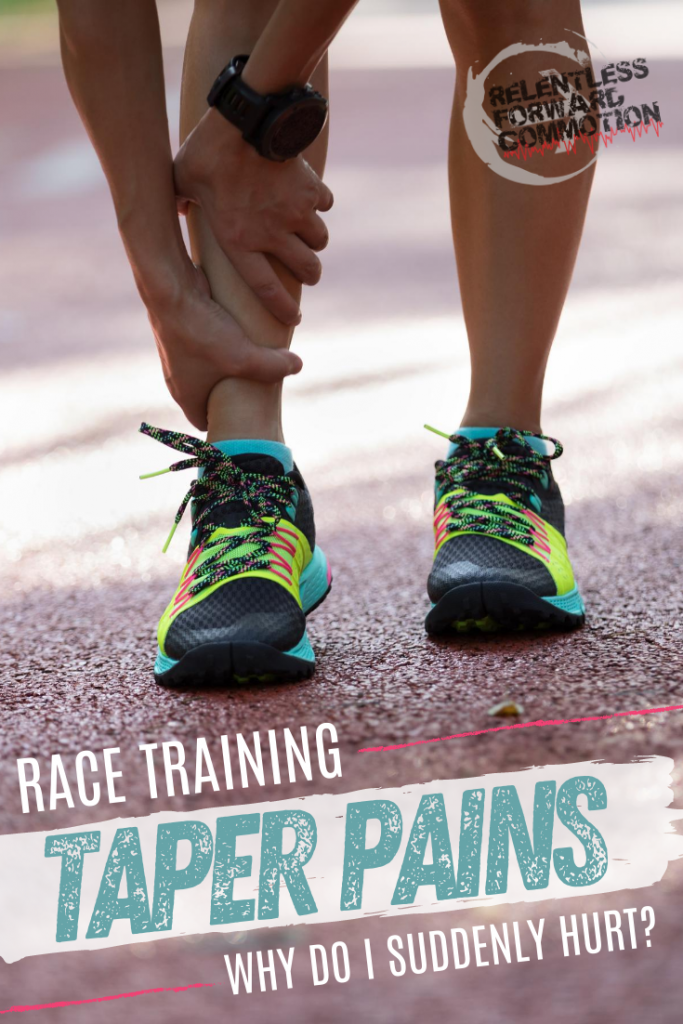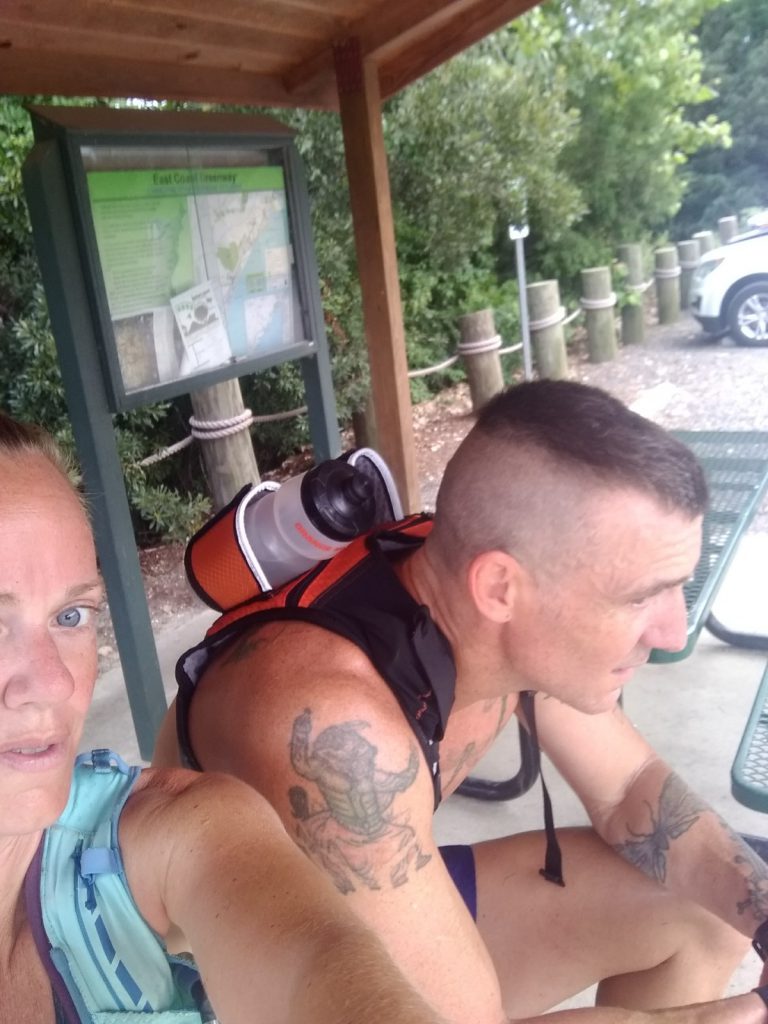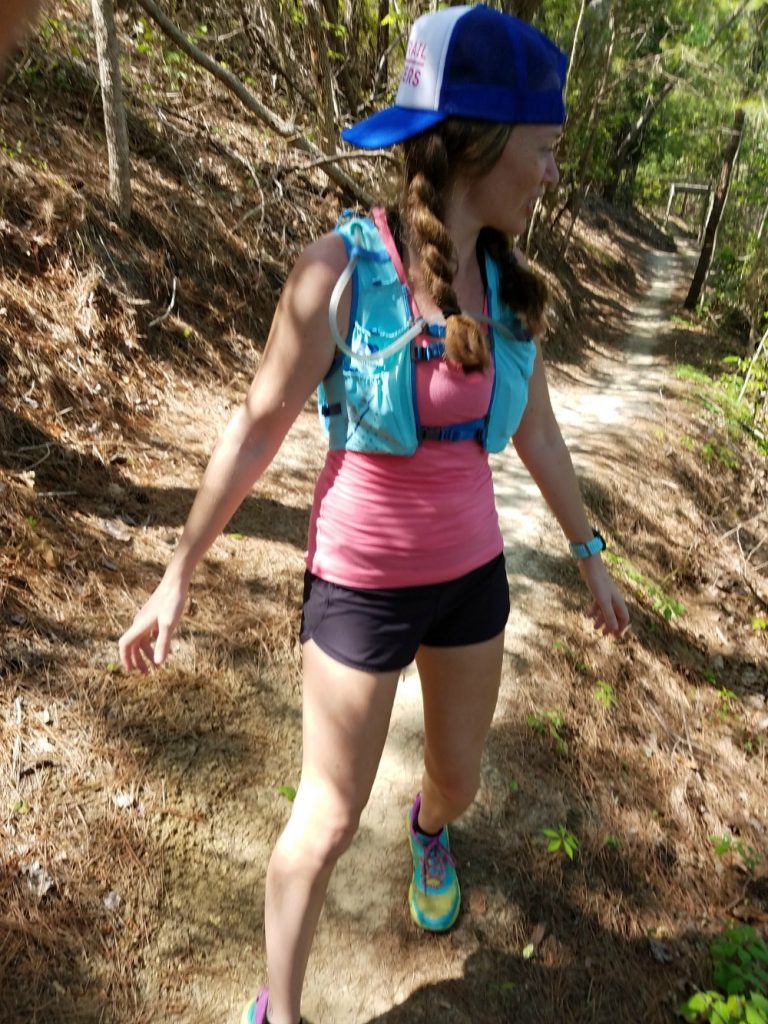Last Updated on July 25, 2020 by Heather Hart, ACSM EP, CSCS
Imagine this: you are in the final stages of tapering for a big race. You’ve trained meticulously for weeks and months on end to get you to the starting line injury free. And now that race day is within reach…your body mysteriously hurts. And it sends you into a panic (rightfully so). Are these aches and pains while tapering for a race indicative of injury, or are they all in your head? Are your race day dreams doomed?

As a coach, I have lost track of the number of times I’ve received panicked emails or text messages from clients who were experiencing phantom pains right before a big race. As a runner myself, I’ve cursed my own body for mysteriously aching while tapering, as I wondered if this was going to ruin my race.
The good news is this: discomforts while tapering are common, and more than likely, aren’t anything to worry about. If that info alone is enough to calm your nerves – then I’m glad I could help! But if you need more reassurance, or need to know why your body is seemingly suddenly turning on you: keep reading.
Why Do We Get Aches and Pains While Tapering for a Race?
During the taper portion of any endurance race training program, your overall mileage will decrease drastically from the peak volume of your training cycle. Overuse injuries are a common concern for runners, which is exactly why taper aches and pains are so maddening. So why are you suddenly hurting when you are running LESS? Let’s dig deeper.
Your Body is Healing
The whole purpose of a taper is to allow your body time to recover from peak training. Thus, you’ll be heading into your goal race with a body that, in theory, is well rested, recovered, and ready to perform optimally.
Peak training is physically, mentally, and sometimes even emotionally taxing. You are used to being tired. Accustomed to being achy or sore. And you are most likely on autopilot, numb to the perpetual exhaustion. Because pushing through the rigors of training is what we (stubborn) runners do, right?
Right.

But now that you’re resting more and running less, your body is taking advantage of the downtime to recover. You’re beginning to come out of that fog of peak training, and you’re noticing the aftermath of the higher mileage. You may be more aware of exhaustion, aches, and pains that have been there all along. Or, you may be feeling the effects of your body hard at work healing damaged tissue
Your Mind is Playing Tricks on You
Could the aches and pains truly be all in your head? Maybe. According to Benjamin Maschke, PT, DPT, OCS “factors such as worrying, anxiety, fear, and even poor sleep have the ability to amplify alarm signals to the brain that together generate a pain experience.” (source)
Further, during taper you may be hyper aware of everything going on simply because you are so emotionally invested in the outcome of race day. The aches and pains might not be phantom – they may truly exist. But you also may be over-analyzing the severity of the pain due to fear that something is “wrong” and may affect your race.

Your Immune System is Compromised
As a response to the excessive physical stress put on your body during peak training, your immune system goes into overdrive. During taper, your body is more susceptible to illness, which is why it’s actually common to see tapering endurance athletes come down with a cold or other illness. Often times, mild colds or other viruses can be responsible for the aches and pains you experience during a taper.
I’m Tapering – I’m Hurting – What Should I Do?
If you find yourself achy or even sick during your taper: do not freak out. Your training “gains” are essentially done at this point. As mentioned already at this point in your training cycle you are simply allowing your body to recover and heal in order to perform optimally. Trying to push through at this point will likely do more harm than good. But here’s what you can do:
Remind Yourself That This is Normal
Take a deep breath and remind yourself that experiencing aches and pains during the taper portion of a training cycle is completely normal. Your race isn’t doomed. You’re going to be OK.
RESPECT YOUR TAPER
This is a big one, friends. During taper, your brain may start to do some crazy things. For example: if the lack of mileage is making you “hurt”, you may have the urge to try and bring your taper volume back up closer to peak volume. But don’t do it.
You need this time to rest, recover, and rebuild in order to have an awesome race experience. TRUST the process, respect your taper.

Eat & Hydrate Well
Taper is the perfect time to focus on eating healthy, nutritious foods, and ensuring your body is well hydrated. Let your food choices help aid in your recovery and healing, rather than hinder it. Some runners may be tempted to cut back on calories and food volume while tapering (since you are running less). Others may be tempted to continue gorging on simple carbohydrates that we often tend to crave during heavy training (pizza, beer, chips…you know what I’m talking about). But the key here is to strike a healthy balance between the two, and give your body what it needs to compliment your taper.
Get Plenty of Sleep
Ideally, you should always be making sure sleep is a priority during a big training cycle. But sleep is extra important during your taper, as that’s when your body does it’s best healing.
Human growth hormone (HGH) is a complex protein produced by the pituitary gland in the brain, and is one of the primary compounds that allows our muscles to recover, rebuild, and grow. Our bodies need HGH to use the amino acids – the literal building blocks of muscle – we take from protein to help repair damaged muscle tissue. Up to 75% of HGH is released in the body at night while you are sleeping. Inconsistent sleep patterns can affect adequate release of HGH. Further research shows that a lack of adequate sleep can actually cause muscle mass to decrease (source).
When in Doubt – Get it Checked Out.
Ultimately, pain is our bodies way of signaling to the brain that something isn’t quite right. If the pain is concerning to you, or feels too intense to be normal taper aches and pains – go get it checked out by a medical professional. Rule out anything serious, and get professional advice on what you should do between now and race day. If nothing else, it will give you peace of mind that there is (hopefully) nothing worth worrying about.
Bottom line – trust in your training.
I know it can be concerning – hell, even downright terrifying – to feel like your body is giving up on you this close to race day. But remember: you’ve put in the work. You’ve asked a lot from your body, and at this point there is nothing more to do. TRUST in your training. Rest. Relax.
And get ready for an amazing race day.
Heather Hart is an ACSM certified Exercise Physiologist, NSCA Certified Strength and Conditioning Specialist (CSCS), UESCA certified Ultrarunning Coach, RRCA certified Running Coach, co-founder of Hart Strength and Endurance Coaching, and creator of this site, Relentless Forward Commotion. She is a mom of two teen boys, and has been running and racing distances of 5K to 100+ miles for over a decade. Heather has been writing and encouraging others to find a love for fitness and movement since 2009.

Leave a Reply